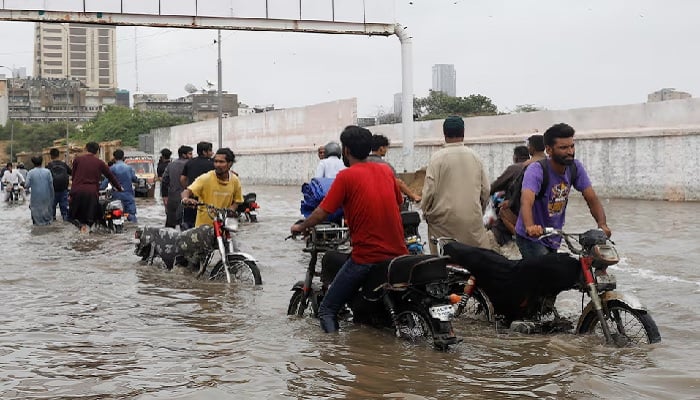
The National Disaster Management Authority (NDMA) has issued a critical alert, forecasting heavy rain and potential flash floods across several parts of Pakistan between July 6 and 10. The advisory urges citizens to remain cautious as a strong westerly wave will combine with active monsoon currents, heightening weather risks nationwide.
High-Risk Areas Identified
From July 7 to 12, northern regions are at the highest risk of flash floods. These include areas in Gilgit-Baltistan and Azad Jammu & Kashmir such as Gilgit, Skardu, Hunza, Neelum Valley, and Muzaffarabad. Evening and nighttime downpours may also trigger landslides and road closures.
In Punjab, moderate to heavy rainfall is forecast in Islamabad, Lahore, Rawalpindi, Faisalabad, and Gujranwala. Southern districts like Multan and Bahawalpur are expected to see light to moderate rain.
Read: Westerly Wave and Monsoon Currents to Trigger Widespread Rainfall
Khyber Pakhtunkhwa and Balochistan
Heavy rain is likely in several districts of Khyber Pakhtunkhwa, including Swat, Chitral, Kohistan, and Abbottabad. This could lead to flooding in local streams and disruptions in transport and communication systems. Balochistan is also on alert, with scattered to heavy rain expected in Quetta, Zhob, Loralai, and Khuzdar. Flash flooding, especially in low-lying areas, remains a major concern.
Urban Flooding in Sindh
Sindh’s urban centers face the threat of flooding due to intense rainfall. Karachi, Hyderabad, Larkana, and Dadu are among the areas forecast to experience waterlogging, traffic disruption, and infrastructure damage. Isolated rain is also likely in Sukkur, Nawabshah, and Mirpur Khas.
Public Safety Advisory
NDMA has urged the public to avoid unnecessary travel and stay indoors during severe weather. Tourists are advised against visiting high-altitude or flood-prone regions. Motorists should not attempt to drive through flooded roads or underpasses.
Local authorities have been instructed to activate emergency response teams, clear drainage systems, and keep the public informed. Citizens can stay updated through NDMA’s official channels and are encouraged to download the Pak NDMA Disaster Alert App for real-time weather updates and safety tips.
Follow us on Instagram, YouTube, Facebook,, X and TikTok for latest updates
